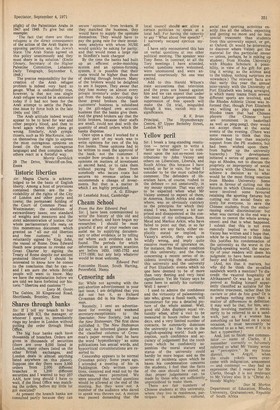Censoring ads
Sir: While not agreeing with the anti-abortion advertisement in your last issue, I am delighted that you did not ban it, as Richard Crossman did in his New Statesman.
Recently, I sent an advertisement for evening and weekend
secretary-receptionists to the Spectator, New Society, Ink and the New Statesnum. The first three published it. The New Statesman did not. An informed glance down the classified columns of Crossman's paper reveals that he bans the word ' hypnotherapy ' as some publications ban sexual words, and hypocritical circumlocutions are resorted to.
Censorship appears to be normal Crossman policy. Some years ago, I attended a meeting of his in Paddington. Only written questions, censored and read out by the chairman, were permitted. We were assured that verbal questions would be allowed at the end of the meeting. But they were not. A member of the audience who dared to speak was thrown out. A motion was passed demanding that the local council shoutd -.sot allow a certain politician to speak at a local hall. For having the temerity to say "What about free speech? ", I narrowly escaped ejection myself.
I have only encountered this ban on verbal questions at one other political meeting. The speaker was Tony Benn. In contrast, at all the Tory meetings I have attended, verbal questions were welcomed, were uncensored and were answered courteously. No one was ejected.
Add to this Harold Wilson's irate accusations that television and the press are biased against him and we can expect that under the next Labour government the suppression of free speech will make the Oz trial, misguided though it was, vanish into insignificance.
R. K. Brian Principal, The Hypnotherapy Centre, .67 Upper Berkeley Street, London WI


































 Previous page
Previous page